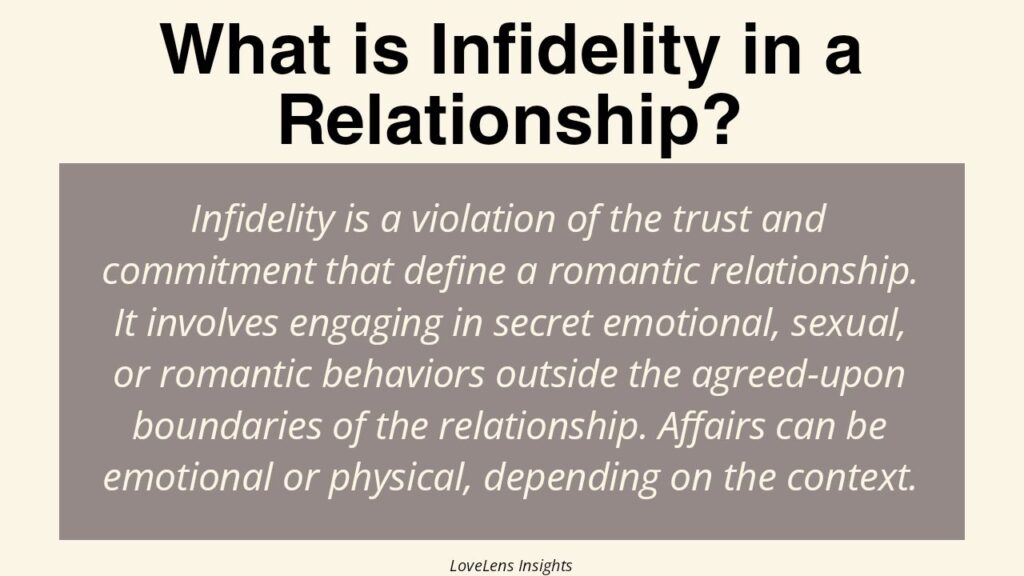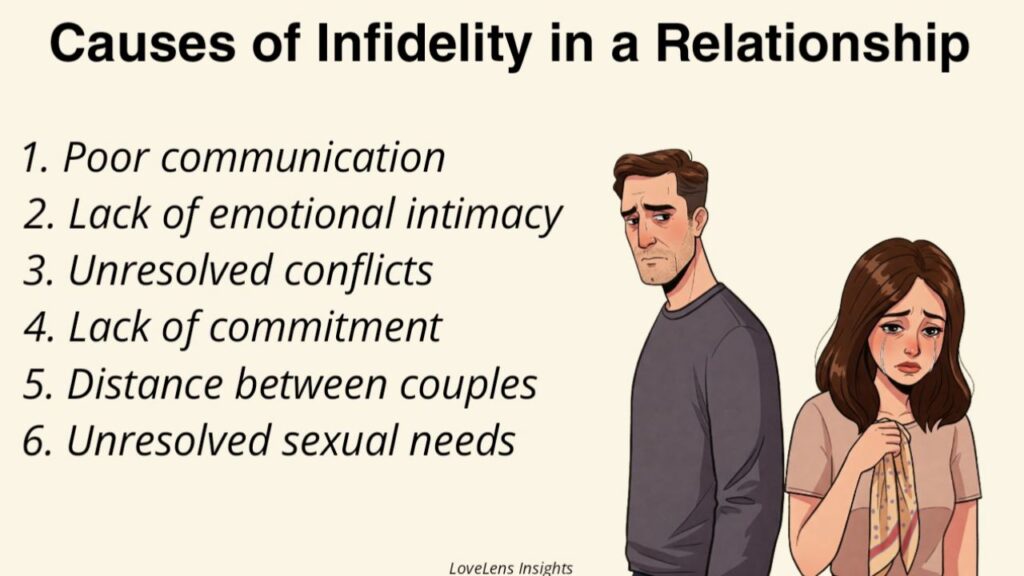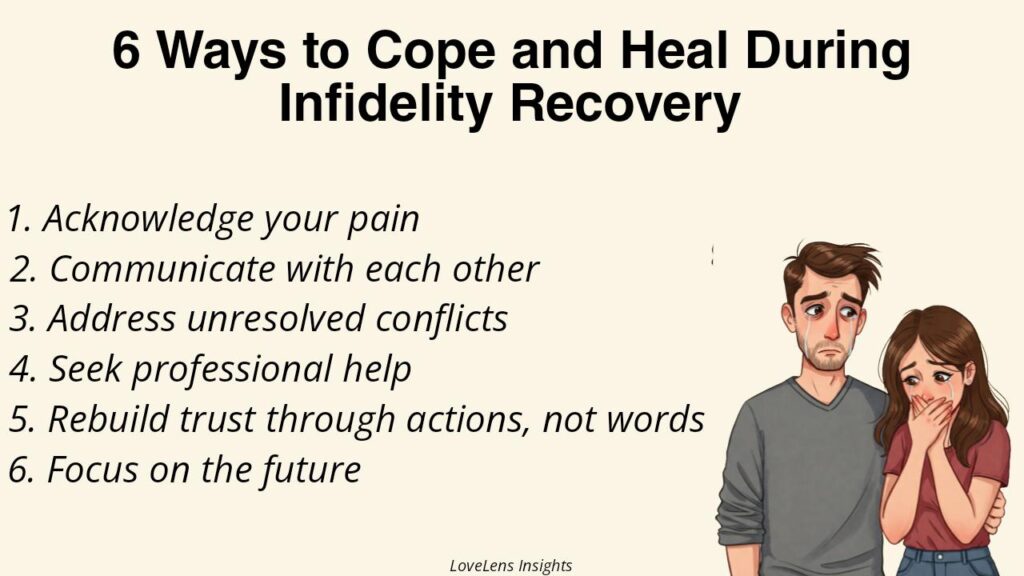You’ve been heartbroken and spent all night questioning everything — your partner’s love, your worth, and even your judgment. Sometimes, you wish you had never loved them till the point of breaking you. The betrayal goes so deep that you become overwhelmed with anger, confusion, and regret. You’ve cried so hard and even wondered if you will ever recover from the pain.
The worst part? You miss their presence. Day after day, random memories from the relationship pop into your head, making you wonder when it’s going to stop. If you’re in this situation, you’re not alone. Healing from infidelity can be painful but possible. Even with the heavy pain in your chest, you can definitely recover. This guide will show you how to cope and heal from the aftermath of infidelity. Let’s get started.
Infidelity is a violation of the trust and commitment that define a romantic relationship. It involves engaging in secret emotional, sexual, or romantic behaviors outside the agreed-upon boundaries of the relationship.
Emotional infidelity happens when one partner forms a deep emotional bond with someone else aside from their partner, sharing intimate thoughts and feelings meant for their significant other. This emotional engagement can feel as hurtful as a physical affair, especially when secrecy is involved.
It can also take place online. Exchanging flirtatious messages, photos, or maintaining secret conversations on social media and messaging apps with a romantic intent may constitute microcheating.
Infidelity is not gender-specific; anyone can experience it or be affected by it. The emotional aftermath can be intense and long-lasting for both partners.
Causes of Infidelity in a Relationship
Understanding the causes of infidelity is important, not only for prevention but for healing and relationship growth. Here are some major causes of infidelity in a committed relationship:
Effective communication is the lifeline of any healthy relationship. When couples stop discussing their thoughts, concerns, and interests, emotional disconnection can slowly set in. Over time, this lack of connection may lead to loneliness, frustration, or neglect, creating a likelihood of seeking a physical or emotional bond with someone else. A survey of 5,000 people in the UK revealed that lack of communication contribute to affair in 68% of men and 75% in women.
Without communication, couples may experience a lack of intimacy, making the relationship more vulnerable to betrayal.
Emotional intimacy involves a mutual nurturing of feelings, innermost thoughts, and experiences with your partner. It is built through shared experiences, open conversations, and mutual support. When this closeness begins to fade, a relationship feels empty, like two people simply coexisting rather than truly connecting.
As you find it more difficult to connect emotionally with your partner, they seem more hostile or colder than usual, generating a feeling of insecurity. As a result, the other partner may tend to seek emotional validation outside the relationship.
Lack of emotional intimacy often results from a gradual breakdown in communication, trust, or shared vulnerability. In the worst cases, it can breed conflicts in relationships.
Every relationship faces conflict, but when disagreements are left unaddressed, they can create an emotional disconnect between partners. Issues that could be resolved immediately with honest communication can escalate into bigger conflicts. This often leads to misunderstanding and constant arguments.
In such an environment, partners may stop feeling safe or supported. Rather than turning toward each other during difficult moments, they might seek comfort in someone else who feels more understanding or easier to talk to. This emotional disconnect makes the relationship vulnerable to infidelity, as a misguided attempt to feel heard, valued, or relieved from constant tension.
When only one partner is invested in the relationship, it creates an imbalance that leads to neglect, insecurity, or confusion. As they stop showing interest in your thoughts or emotional needs, it may leave the other partner insecure or uncertain in the relationship. Over time, emotional exhaustion sets in, and the foundation of trust begins to weaken.
In some cases, a partner with a higher sense of power may feel motivated to disregard the commitment essential to thrive in the relationship and act on desires, especially if they believe their partner is dependent on them.
When partners are separated due to work, studies, or other circumstances, the absence of regular physical closeness may affect the relationship. Over time, this results in a lack of sexual and emotional intimacy, leading to frustration or disconnection, which prompts them to become unfaithful. Also, long-distance relationships can make some partners feel less accountable for their unfaithful behaviours. This physical separation can lead such partners to infidelity.
In some cases, infidelity can stem from unmet sexual desires. When couples experience differing sexual preferences, it could result in seeking intimacy outside the relationship.
For instance, your partner may enjoy sexual adventures while you may be satisfied with a routine; this sexual incompatibility can be a motivation for infidelity.
Boredom can also creep in when couples are not nurturing their bond. This enables some partners to seek new experiences elsewhere. Over time, feelings of frustration may build up, allowing the partner to seek fulfillment elsewhere. When individuals no longer feel sexually satisfied with their partners, they may turn to someone else who appears to provide the satisfaction they seek.
You can also read: How to Stop Overthinking After Being Cheated On
Whether or not partners can recover from infidelity depends on the two individuals and the bond they have already built. Below are six effective ways to start your healing process and recover from infidelity.
Acknowledge your pain. Accept that the affair happened and understand its impact on your emotional and physical well-being. Explore the reasons behind the betrayal and address any underlying issues in the relationship or within yourself. Don’t suppress the pain or fight it, as that can prolong the recovery process.
However, recognizing emotions such as anger, sadness, and regret can be the start of your healing journey. Address them openly if you want. This can help process the trauma and help you heal gradually.
Both partners should engage in honest conversations by actively listening to each other. They should be empathetic and engage in respectful dialogue to address the betrayal and work toward rebuilding trust.
The cheating partner must also acknowledge their partner’s pain and be willing to provide full disclosure about the infidelity. They’ve got to be transparent about the extramarital affairs. In a podcast interview, Dr Julie Gottman says, “the betraying partner must listen to the other partner’s feelings without defensiveness.”
This would help the other partner have a clear understanding of what happened, process their emotions. Also, acknowledge and validate the betrayed partner’s emotions to create a safe space and make them feel heard.
Conflicts often stem from unmet needs, rather than just the infidelity itself. The affair partner must address the other partner’s pressing needs to make them feel seen and heard.
Acknowledge each other’s emotions and work together to achieve the goal. Compromise if necessary. By addressing underlying issues, you can provide emotional support and rebuild a connection to help your partner heal and prevent future betrayals.
A trained therapist or marriage counselor acts as a neutral facilitator, guiding discussions on sensitive topics and helping both partners express their emotions openly and honestly. They provide a safe and structured environment for partners to address the emotional aftermath of betrayal, explore the root causes of the infidelity, and work toward rebuilding trust.
This couple’s therapy uncovers underlying relationship issues, such as communication breakdowns or unmet emotional needs, that may have contributed to the affair. Through techniques like role-playing, communication exercises, and conflict resolution strategies, couples can seek support, rekindle emotional connection, and prevent future issues.
For some people, individual therapy may be beneficial to process personal emotions, rebuild self-worth, address compulsive behaviors, and achieve personal growth.
If the partner who got cheated on chooses to stay, they can rebuild trust. However, you must note that rebuilding trust during the affair recovery process isn’t instantaneous. It takes time, sometimes months or years. Trust is rebuilt over time through repeated demonstrations of reliable behavior, such as consistency. The betrayed partner needs to see consistent efforts that show the affair partner prioritizes the relationship and their emotional well-being.
Actions that consistently demonstrate reliability, transparency, and commitment rather than relying solely on verbal reassurances rebuild trust. The unfaithful partner must show remorse through concrete behaviors, such as ending the affair, maintaining honesty, and being fully transparent about their activities.
For instance, you can share passwords, adhere to agreed-upon boundaries, and be accountable for your whereabouts. Remember, if your partner overthinks, you must over-explain.
Finally, shift the focus from past betrayals to building a stronger, healthier relationship. Both partners should work together to envision a future where trust is rebuilt, communication is improved, and mutual respect is strengthened.
Creating a new narrative for the relationship, one that includes growth, forgiveness, and renewal, can be empowering. This process allows partners to redefine their relationship dynamics, fostering a more resilient and fulfilling connection. This doesn’t mean forgetting what happened, but rather using those experiences as lessons to grow and improve.
Setting new relationship goals and working together to achieve them can help create a sense of unity and shared purpose.
You can also read: How to heal from emotional abuse in a relationship
Recovering from infidelity is a deeply personal journey with no universal timeline, often spanning months to years. The process hinges on factors like the relationship’s history, the affair’s nature (emotional, physical, or both), and how both partners respond after discovery.
The journey typically unfolds in phases. First is the crisis phase (weeks to months), which involves shock, anger, and deciding whether to continue the relationship. Immediate steps include ending the affair and establishing honesty.
Next, processing emotions (3–12 months) requires exploring the root causes of the betrayal, open communication, and grieving the loss of trust. Rebuilding trust (6–24 months) relies on the unfaithful partner’s consistent actions, small steps toward intimacy, and addressing communication patterns, often with therapy.
Finally, reinvention (1–3+ years) involves creating a new normal with revised boundaries, and forgiveness if it happens as a gradual release of resentment, not forgetting. Functional recovery might take 6–12 months with intense effort, but full emotional healing often requires 2–5 years, especially for deep betrayals. Even if the relationship ends, individual recovery (regaining self-esteem or stability) can take 1–2 years.
Whether cheaters stop cheating depends on various factors, including their willingness to change, genuine remorse, self-awareness, and accountability.
The pain from infidelity can fade over time, but it often requires intentional effort and support to heal. While the emotional aftermath is deeply scarring, recovery is possible with patience and dedication.
Moving on from a partner’s infidelity is a challenging but achievable process. Following the six steps above, you are on your way to healing.


